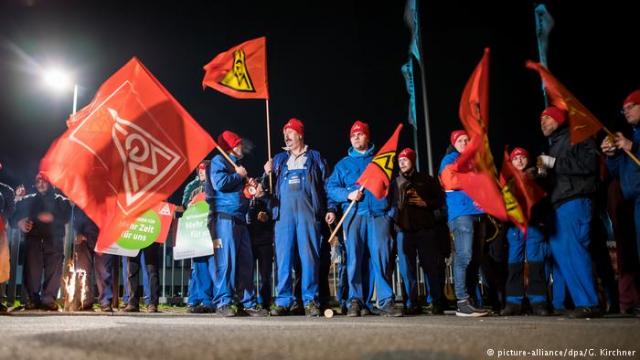
BERLIN — Earlier this year, around 4 million metalworkers and electricians throughout Germany won a hard-fought battle for the right to decrease their workweek to 28 hours for periods as long as two years without jeopardizing their status as full-time employees.
Won after months of talks between Germany's dominant metalworkers' union, IG Metall, and manufacturers amid intermittent strikes carried out by 1.5 million workers across the country, the arrangement signals a new chapter in the evolution of German work culture.
"It's an interesting turning point because we see that there is more flexibility coming into the labor market," Carsten Brzeski, chief economist at ING-DiBa in Frankfurt, told Occupy.com. "It also shows this cultural change that people are interested in a better work-life balance and no longer in just more money."
In what the German media dubbed the "hardest rounds of collective bargaining in decades," IG Metall entered into negotiations with manufacturers last fall with a clear goal: a 6 percent wage increase and a flexible workweek so laborers can spend more time caring for children and parents and pursuing other goals.
Many chastised the union's position as too costly for industry at a time when Germany is staring down a shortage of skilled labor in the coming decades. By 2030, German employers could need as many as 3 million skilled laborers due to declining birthrates and lack of interest in industries like metalwork, according to a 2017 study by the Swiss economic research institute Prognos.
But Jörg Hofmann, chairman of IG Metall, told German public broadcaster Deutschlandfunk in an interview in January that the union estimates that only 4 to 5 percent of workers will take advantage of the new work arrangement at any given time – mostly to take care of family.
Even if more workers take more time off, others would likely flock to the industry on account of the new benefits, he added.
"[Employers] show flexibility when the customer wants it," he said. "And we think they should also show flexibility when it comes to the interests of employees."
Under the deal struck between management and labor, metalworkers last month saw their wages increase by 4.3 percent. In addition to the option of working 28 hours per week for up to two years, workers will also receive a standard bonus every July worth 27.5 percent of their monthly wages.
For shift workers who have worked at least five years at a company, parents with children younger than eight years old or workers with a family member in need of care can exchange the new bonus for eight additional vacation days per year.
In return, employers can introduce a temporary workweek of up to 40 hours per week for up to 18 percent of their workforce – five hours more than the legally mandated 35 hours per week – in order to make up for those utilizing the new leave scheme. But they can only do so until the average workweek per full-time employee in the factory reaches 35.9 hours per week.
"What is culturally significant is the fact that the option of an individual reduction of working hours is linked to important social problems such as finding spare time for relatives or partners in need of care," Klaus Dörre, a sociologist at the University of Jena, told Occupy.com.
In recent years, the work-life balance debate has become increasingly prevalent in Germany, a country where traditional, family-owned industries have dominated economic output for generations.
Though traditional processes helped make Germany Europe's largest and healthiest economy, many enterprises worry about the effects that a new digital economy will have on their production models. They're now looking to become more attractive to a new generation of young workers demanding flexibility in a digitalized workplace.
This new agreement signals that Germany's traditional industries are taking such calls seriously, said Dürre. "Many highly skilled professionals today want more than just good pay and an interesting job," he said. "They want to be in charge of disposable time – that is to say, time to live."
But such extreme flexibility for full-time employees could have negative side effects as well, said Brzeski. Production could taper off if the new work model fails to draw young people back to traditional industries that are often in rural enclaves far removed from the cities favored by millennials.
Moreover, "if worst comes to worst, men will perhaps work longer hours and women might accept the reduction of working hours, which would certainly add to cementing gender hierarchies," said Dörre.
Even so, the perceived benefits of reduced hours and a flexible work arrangement can only help to bolster the staying power of these ailing traditional industries in Germany, Dörre added.
After all, they're taking a page out of a work model long implemented by startups that favor a culture of flexibility and efficiency over more rigid work schedules, he said.
"Real wealth consists of the time available for each individual and for society as a whole," he said, citing Karl Marx. "Reduced full-time [work] of 28 hours per week over a period of two years represents a compromise which entails advantages for all sides."
















